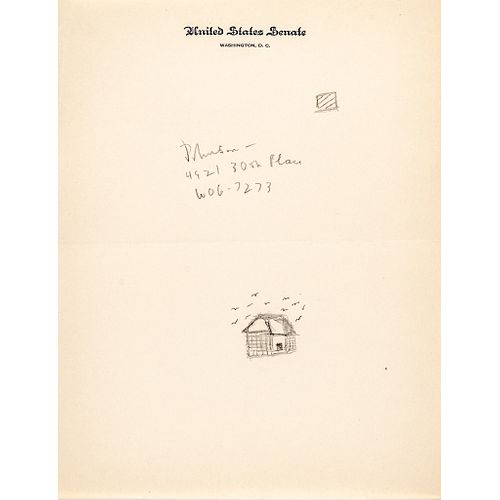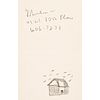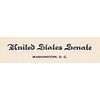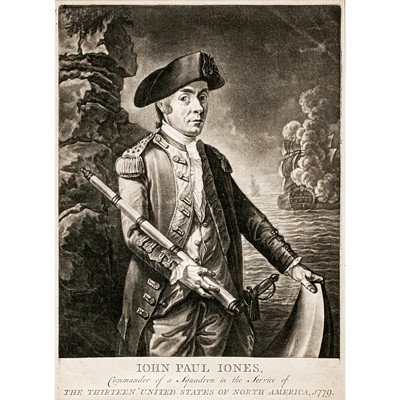(JOHN F. KENNEDY) Writes Lyndon Johnson Address + Phone Number Adding DOODLES
Lot 31
About Seller
Early American History Auctions
1520 Commerce St., #312
Winchester, VA 22601
United States
Categories
Estimate:
$1,000 - $1,500
Absentee vs Live bid
Two ways to bid:
- Leave a max absentee bid and the platform will bid on your behalf up to your maximum bid during the live auction.
- Bid live during the auction and your bids will be submitted real-time to the auctioneer.
Bid Increments
| Price | Bid Increment |
|---|---|
| $0 | $10 |
| $200 | $20 |
| $300 | $25 |
| $500 | $50 |
| $1,000 | $100 |
| $2,000 | $200 |
| $3,000 | $250 |
| $5,000 | $500 |
| $10,000 | $1,000 |
| $20,000 | $2,000 |
| $30,000 | $2,500 |
| $50,000 | $5,000 |
| $100,000 | $10,000 |
| $200,000 | $20,000 |
| $300,000 | $25,000 |
| $500,000 | $50,000 |
About Auction
By Early American History Auctions
Jan 23, 2021
Set Reminder
2021-01-23 12:00:00
2021-01-23 12:00:00
America/New_York
Bidsquare
Bidsquare : Early American History Auction of Autographs, Americana, Political & Maps
https://www.bidsquare.com/auctions/early-american-history-auctions/early-american-history-auction-of-autographs-americana-political-maps-6311
311 Lots of Rare, Historic Autographs, Americana, Civil War Era, George Washington, Abraham Lincoln, Slavery & Black History, Revolutionary War Era, Colonial America, Federal Period, War of 1812, Colonial Currency, Indian Peace Medals & more... Early American History Auctions auctions@earlyamerican.com
311 Lots of Rare, Historic Autographs, Americana, Civil War Era, George Washington, Abraham Lincoln, Slavery & Black History, Revolutionary War Era, Colonial America, Federal Period, War of 1812, Colonial Currency, Indian Peace Medals & more... Early American History Auctions auctions@earlyamerican.com
- Lot Description
Autographs
John F. Kennedy Writes Down Lyndon Baines Johnson's Address and Phone Number, Adding His Drawn "Doodles"
(JOHN F. KENNEDY) (1917-63). 35th President of the United States (1961-63). John Fitzgerald Kennedy, often referred to by his initials JFK, was an American politician who served as President of the United States from January 1961 until his Assassination in November 1963. Served as United States Senator from Massachusetts in office, January 3, 1953-December 22, 1960.
This highly uncommon, (John F. Kennedy) Written Page is on JFK's "United States Senate" official Letterhead, on which he pencils, in his own hand: "Johnson -- 4921 30th Place - WO6-7273", Unsigned Choice Near Mint. A researcher at the Lyndon Baines Johnson Presidential Library years ago verified that the written data as indeed being LBJ's District of Columbia street address and telephone number. Above it at right, Senator Kennedy drew a small square with four diagonal lines therein and, at below center, what appears to be a Beach House or Cabin with eleven Seagulls flying above. Unfortunately, this piece is not dated, as historians would love to assume that JFK wrote this information in the summer of 1955, immediately upon hearing the news of Johnson's severe heart attack when JFK would want to extend his good wishes. Nonetheless, Kennedy would select Lyndon Johnson as his Vice Presidential Running mate in the 1960 Presidential Campaign as Democrats, and the pair would defeat the Nixon-Lodge Republican ticket in that November election. Three years later, John Kennedy's assassination would make Lyndon Johnson the 36th President of the United States. This 10.5" x 8" official headed United States Senate Stationery is fresh and bright, has one light horizontal fold and a very faint crease along the top left edge being nowhere near JFK's Handwriting or Doodles. Provenance: This JFK Hand-notated official Senate Sheet came from the papers of Kennedy's friend, the late Congressman Michael J. Kirwan of Ohio (1886-1970), then from Mrs. Kirwan to the future Presidential historian John Burke Jovich. A fresh, crisp and carefully treasured memento created by then Senator John F. Kennedy. Unique.
John Fitzgerald Kennedy (May 29, 1917 - November 22, 1963), is often referred to by his initials JFK, was an American politician who served as the 35th president of the United States from January 1961 until his assassination in November 1963. Kennedy served at the height of the Cold War, and the majority of his work as president concerned relations with the Soviet Union and Cuba. A Democrat, Kennedy represented Massachusetts in the U.S. House of Representatives and Senate prior to becoming president.
Kennedy was born into a wealthy, political family in Brookline, Massachusetts. He graduated from Harvard University in 1940, before joining the U.S. Naval Reserve the following year. During World War II, he commanded a series of PT boats in the Pacific theater and earned the Navy and Marine Corps Medal for his service. After a brief stint in journalism, Kennedy represented a working-class Boston district in the U.S. House of Representatives from 1947 to 1953.
He was subsequently elected to the U.S. Senate and served as the Junior Senator for Massachusetts from 1953 to 1960. While in the Senate, Kennedy published his book, Profiles in Courage, which won a Pulitzer Prize.
In the 1960 presidential election, he narrowly defeated Republican opponent Richard Nixon, who was the incumbent vice president. Kennedy's humor, charm, and youth in addition to his father's money and contacts were great assets in the campaign. Kennedy expertly presented his platform and himself using a new medium, television. Kennedy was the first Catholic elected president.
Kennedy's administration included high tensions with communist states in the Cold War. As a result, he increased the number of American military advisers in South Vietnam. The Strategic Hamlet Program began in Vietnam during his presidency. In April 1961, he authorized an attempt to overthrow the Cuban government of Fidel Castro in the failed Bay of Pigs Invasion.
Kennedy authorized the Cuban Project in November 1961. He rejected Operation Northwoods (plans for false flag attacks to gain approval for a war against Cuba) in March 1962. However, his administration continued to plan for an invasion of Cuba in the summer of 1962. The following October, U.S. spy planes discovered Soviet missile bases had been deployed in Cuba; the resulting period of tensions, termed the Cuban Missile Crisis, nearly resulted in the breakout of a global thermonuclear conflict. He also signed the first nuclear weapons treaty in October 1963.
Kennedy presided over the establishment of the Peace Corps, Alliance for Progress with Latin America, and the continuation of the Apollo space program with the goal of landing a man on the moon. He also supported the African-American civil rights movement, but was only somewhat successful in passing his New Frontier domestic policies.
On November 22, 1963, he was assassinated in Dallas. Vice President Lyndon B. Johnson assumed the presidency upon Kennedy's death. Marxist and former U.S. Marine Lee Harvey Oswald was arrested for the state crime, but he was shot and killed by Jack Ruby two days later. The FBI and the Warren Commission both concluded Oswald had acted alone in the assassination, but various groups contested the Warren Report and believed that Kennedy was the victim of a conspiracy. After Kennedy's death, Congress enacted many of his proposals, including the Civil Rights Act and the Revenue Act of 1964.
Despite his truncated presidency, Kennedy ranks highly in polls of U.S. presidents with historians and the general public. His personal life has also been the focus of considerable sustained interest following public revelations in the 1970s of his chronic health ailments and extramarital affairs.
- Shipping Info
-
Early American provides in-house worldwide shipping. Please contact us directly if you have questions about your specific shipping requirements.
-
- Buyer's Premium



 EUR
EUR CAD
CAD AUD
AUD GBP
GBP MXN
MXN HKD
HKD CNY
CNY MYR
MYR SEK
SEK SGD
SGD CHF
CHF THB
THB













